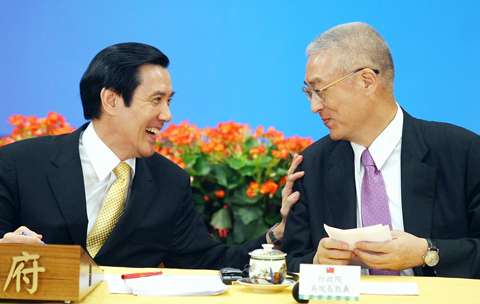|
¡@
Ma admits PRC sees ECFA as tool
¡¥HEAD IN THE SAND¡¦: The opposition said everybody except the president knew
that Beijing saw the trade agreement as an instrument to facilitate unification
By Mo Yan-chih
STAFF REPORTER
Friday, Jul 02, 2010, Page 1
¡§[O]ur assessments led us to believe it was a deal that we
could go ahead with.¡¨¡ÐPresident Ma Ying-jeou

President Ma Ying-jeou, left, exchanges words
with Premier Wu Den-yih following a press conference at the Presidential Office
yesterday.
PHOTO: CNA
President Ma Ying-jeou (°¨^¤E) yesterday said that while he was aware that China
had a political agenda behind the recently signed Economic Cooperation Framework
Agreement (ECFA), Taiwan¡¦s sovereignty would not be harmed by the trade deal
with China.
The president said he recognized China¡¦s ultimate intention was to take over
Taiwan, but said there was no ¡§political language or demands¡¨ in the ECFA
document.
Prior to the signing, Ma said issues such as the potential political impact the
agreement would have on Taiwan or how it would affect cross-strait developments
were all being carefully considered.
¡§There were concerns about the possible harm mainland China would cause us via
the ECFA, but our assessments led us to believe it was a deal that we could go
ahead with,¡¨ Ma told a press conference at the Presidential Office yesterday.
¡§Moreover, members of the international community view the ECFA as a giant step
toward cross-strait harmony,¡¨ he said.
Speaking with a roomful of local and foreign reporters two days after the ECFA
was signed in China, Ma said the two sides of the Taiwan Strait had reached a
consensus to seek economic cooperation before negotiating on political issues.
Asked to comment on China¡¦s failure to remove the estimated 1,500 missiles it
still has aimed at Taiwan, Ma, who had previously vowed not to enter into
negotiation with China unless the missiles were removed, said it was a thorny
issue for the two sides, adding that the timing was not ripe to handle political
issues.
¡§Both sides agreed that we should put aside political issues for now and solve
economic problems first,¡¨ Ma said.
Ma dismissed the opposition camp¡¦s labeling of the ECFA as a preliminary step
toward unification and said his administration would adopt ¡§practical¡¨ policies
by making economic issues a priority in the present stage before turning to
political issues.
Ma said that more economic problems remained to be discussed and negotiated upon
and that the ECFA, as other cross-strait policies promoted by his
administration, would give the people on either side of the Taiwan Strait a
chance to better understand each other.
At a separate setting yesterday, Democratic Progressive Party spokesperson Tsai
Chi-chang (½²¨ä©÷) said Ma¡¦s comments made it clear ¡§to everyone but the president¡¨
that China¡¦s political ambition is to erase Taiwan¡¦s sovereignty.
¡§Everybody knows that the negotiations were heavily political and included
[China¡¦s] motives for unification, but Ma pretends he can¡¦t see them and buries
his head in the sand like an ostrich,¡¨ Tsai said.
Tsai said the DPP believed that Beijing¡¦s political ambitions for Taiwan were
what initially sparked negotiations for the ECFA, adding that ¡§this became more
readily apparent during the negotiations.¡¨
¡§The ECFA was part of China¡¦s political strategy right from the start ¡K The only
person that still can¡¦t see this is the president,¡¨ he said.
¡@
|
![]()
![]()
![]()